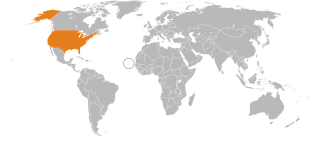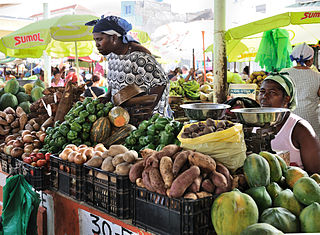| |||||
| Decades: | |||||
|---|---|---|---|---|---|
| See also: | |||||
The following lists events that happened during 1963 in Cape Verde .
| |||||
| Decades: | |||||
|---|---|---|---|---|---|
| See also: | |||||
The following lists events that happened during 1963 in Cape Verde .
The Cape Verdean Armed Forces, Cabo Verdean Armed Forces or FACV are the military of Cape Verde. They include two branches, the National Guard and the Coast Guard.

The recorded history of Cape Verde begins with the Portuguese invasion and colonization of the island in 1458. Possible early references to Cape Verde date back at least 2,000 years.

Cape Verde is known internationally for morna, a form of folk music usually sung in the Cape Verdean Creole, accompanied by clarinet, violin, guitar and cavaquinho. Funaná, Coladeira, Batuque and Cabo love are other musical forms.

José Maria Pereira Neves is a Cape Verdean politician who is currently the president of Cape Verde, having previously served as the Prime Minister of Cape Verde from 2001 to 2016. He is a member of the African Party for the Independence of Cape Verde (PAICV). In the 2021 presidential election, he was elected with 51.7% of votes, beating his nearest rival Carlos Veiga who got 42.4% of the total votes.

A Cape Verde hurricane or Cabo Verde hurricane is an Atlantic hurricane that originates at low-latitude in the tropical Atlantic from a tropical wave that has passed over or near the Cape Verde islands after exiting the coast of West Africa. The average Atlantic hurricane season has about two Cape Verde hurricanes, which are often the largest and most intense storms of the season due to having plenty of warm open ocean over which to develop before encountering land or other factors prompting weakening. A good portion of Cape Verde storms are large, and some, such as hurricanes Allen, Ivan, Dean, and Irma have set various records. Most of the longest-lived tropical cyclones in the Atlantic basin are Cape Verde hurricanes. While many move harmlessly out to sea, some move across the Caribbean Sea and into the Gulf of Mexico, becoming damaging storms for Caribbean nations, Central America, Mexico, Bermuda, the United States, and occasionally even Canada. Research projects since the 1970s have been launched to understand the formation of these storms and their movement through the Main Development Region.

The Cape Verde national football team represents Cape Verde in men's international football, and is controlled by the Cape Verdean Football Federation. The team has never qualified for the FIFA World Cup, but has qualified for four Africa Cup of Nations tournaments, in 2013, 2015, 2021 and 2023. The team achieved their best result in 2023 after making it past the first round of the knockout stage.
Cape Verdean Americans are an ethnic group of Americans whose ancestors were Cape Verdean. In 2010, the American Community Survey stated that there were 95,003 Americans living in the US with Cape Verdean ancestors.

Cape Verde has sent athletes to every Summer Olympic Games held since 1996. No athletes from Cape Verde have competed in any Winter Olympic Games.

Cape Verde is an island nation, part of the Macaronesian group of islands of the Atlantic Ocean and was a Portuguese colony during the colonial era between 1460 and 1975. EU-Cape Verde relations are founded on the EU/Cape Verde Special Partnership, agreed in 2007, building on six pillars:

Cape Verde–United States relations are the international relations between Cape Verde and the United States.

Cape Verde competed at the 2008 Summer Olympics in Beijing, China. Their participation marked their fourth Olympic appearance. Two Cape Verdeans competed in the Olympic games: Nelson Cruz participated as a marathon runner, and Wania Monteiro participated in gymnastics. Another athlete, Lenira Santos, was selected to compete in athletics but was forced to pull out due to injury. Monteiro was selected as the flag bearer for both the opening and closing ceremonies. Neither of the Cape Verdeans progressed beyond the first round.

The economy of Cape Verde is a service-oriented economy that is focused on commerce, trade, transport and public services. Cape Verde is a small archipelagic nation that lacks resources and has experienced severe droughts. Agriculture is made difficult by lack of rain and is restricted to only four islands for most of the year. Cape Verde's economy has been steadily growing since the late 1990s, and it is now officially considered a country of average development, being only the second African country to have achieved such transition, after Botswana in 1994. Cape Verde has significant cooperation with Portugal at every level of the economy, which has led it to link its currency first to the Portuguese escudo and, in 1999, to the euro.

Cape Verde or Cabo Verde, officially the Republic of Cabo Verde, is an archipelago and island country of West Africa in the central Atlantic Ocean, consisting of ten volcanic islands with a combined land area of about 4,033 square kilometres (1,557 sq mi). These islands lie between 600 and 850 kilometres west of Cap-Vert, the westernmost point of continental Africa. The Cape Verde islands form part of the Macaronesia ecoregion, along with the Azores, the Canary Islands, Madeira and the Savage Isles.

Cape Verde was a colony of the Portuguese Empire from the initial settlement of the Cape Verde Islands in 1462 until the independence of Cape Verde in 1975.

Visitors to Cape Verde must obtain a visa to enter, unless they come from one of the visa-exempt countries, which are mostly in Africa, Europe and the Americas. Visa may be obtained in advance from a Cape Verde embassy or consulate, or in person upon arrival at any of the international airports.
This is a list of the Cape Verde national football team results from 2000 to 2019.
The COVID-19 pandemic in Cape Verde is part of the worldwide pandemic of coronavirus disease 2019 caused by severe acute respiratory syndrome coronavirus 2. The virus was confirmed to have reached Cape Verde in March 2020.